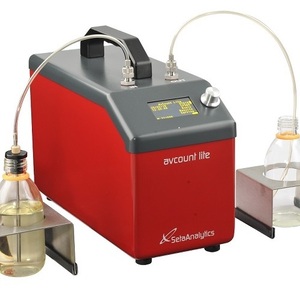Particle counting in diesel fuel and biodiesel blends

Photo: Stanhope-Seta Ltd.
February 20, 2017
BY Stanhope-Seta Ltd.
Modern diesel engines achieve high fuel efficiency and lowered emissions due to the use of complex fuel systems and modern fuels. The quality of the fuel has a direct impact on performance and component longevity. In fact, poor performance and component failure is more likely to be related to the condition of the fuel than to mechanical fatigue.
The quality of diesel fuel is governed by international specifications such as ASTM D975, D7467 and EN 590. They regulate the physical properties of the fuel, including cleanliness. Cleanliness, or more specifically particle content, is a key factor in fuel quality.
Particle counters are simple to operate and provide immediate results. They measure and count particles, presenting the results in size bands, giving a snapshot of the particle distribution in terms of particles/ml and ISO 4406 cleanliness codes.
The cleanliness limits in the World Wide Fuel Charter are presented in terms of particle counting and diesel fuel specifications ASTM D975 and D7467 recommend using particle counting as a method of testing degradation of diesel fuel that has been in storage for extended periods. ASTM test method D7619 for particle counting in middle distillate fuels includes diesel and biodiesel blends in its scope.
Advertisement
Condition monitoring
Diesel and biodiesel blends are monitored at the refinery prior to release into the distribution system. However, diesel degrades within a few months, biodiesels deteriorate even more rapidly. When the fuel is being stored in bulk for extended periods, oxidation, condensation, corrosion of pipework and tanks, and airborne contamination degrade the fuel and increase the particle count.
At the end of the distribution chain, the vehicle fuel tank, is in the worst possible environment and cannot be monitored. The quality of the fuel reaching the engine is entirely reliant upon the filters and systems installed by the vehicle manufacturer. The more resistant the fuel is to thermal degradation and the cleanliness of the fuel entering the tank reduce the reliance on filtration and extend the life between changes.
Management of water and biological growth
Advertisement
Ultra-low sulfur diesels (ULSD) are capable of holding relatively large volumes of water, further exacerbated by blending in biodiesel stock; the fatty acid methyl ester (FAME) content can effect the volume of water that can be dissolved in the resulting biodiesel blend. Particles can act as a seed to coalesce the water into droplets that can settle as free water in the bottom of a fuel tank. The interface between the free water and the fuel is a perfect environment for microbial activity; the resulting biomatter can rapidly block filters and fuel lines.
AvCount Lite
Particle counting is an established method used to better understand and monitor the cleanliness of fuels. Whether within the distribution network or in the laboratory, the portable AvCount Lite is a very compact, full-featured particle counter that can be battery or mains powered. It provides an accurate determination of particle distribution in a liquid sample. Samples can be drawn from bottles or online with real-time test progress and results displayed, allowing for immediate corrective action. Avcount Lite is preprogrammed with three fully automated test methods, including ASTM D7619, covering middle distillate fuels, including diesels, biodiesels and biodiesel blends.
Click here for more information on particle counting.
Stanhope-Seta Ltd. designs and manufactures quality control instruments used to measure the physical characteristics that determine product quality. Seta instruments are used by many diverse industries including oil refining, petrochemical, lubricants, pharmaceutical, food, cosmetics, plastics and transport.
Related Stories
Clean Fuels Alliance America on June 10 announced the launch of the newly redesigned BQ-9000 website, delivering a streamlined and user-friendly experience that better showcases the value of biodiesel quality assurance.
Pertamina, a national energy company in Indonesia, has successfully condcuted static tests on sustainable aviation fuel (SAF) on CFM56-7B jet engines commonly used in commercial aircraft at GMF Aeroasia's Test Cell facility.
Iowa Central Community College on July 17 broke ground on a an expanded fuel testing lab that will benefit ethanol, biodiesel and other types of fuel. The new biofuel testing lab is expected to be complete in the fall of 2024.
NREL released its Assessment of BQ-9000 Biodiesel Properties for 2022. The report documents the quality of biodiesel from U.S. and Canadian-based producers that participate in the industry's voluntary quality assurance program, BQ-9000.
North American SAF Conference & Expo announces agenda
SAF Magazine and the Commercial Aviation Alternative Fuels Initiative (CAAFI) announced the preliminary agenda for the North American SAF Conference & Expo taking place Aug. 29-30 at the Minneapolis Convention Center in Minneapolis, Minnesota.
Upcoming Events










